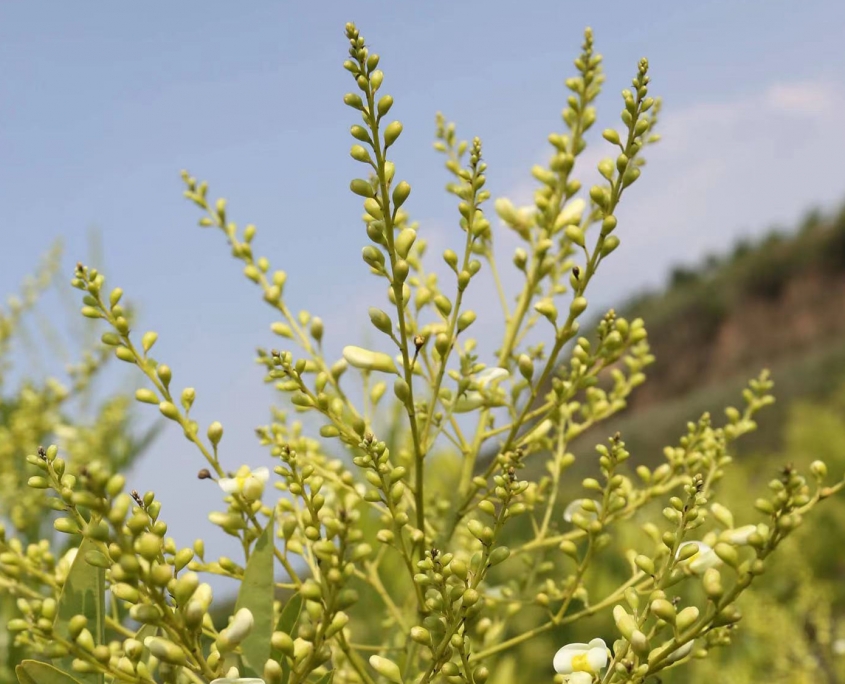Sophora japonica is an herb commonly used in Chinese medicine. It is a member of the leguminous family, and its buds, flowers, leaves, and seeds are harvested for medicinal purposes. In China, dried flowers treat headaches, pyoderma, high blood pressure, and bleeding hemorrhoids. For many years, Sophora japonica has been used as a medicine in traditional Chinese medicine, compounds extracted from dried flower buds of Sophora japonica were found to have analgesic, anti-oxidation, anti-inflammatory, and anti-cancer properties. Some of these compounds are known to have medicinal value, including rutin and quercetin. Sophora japonica extract is good for the skin because it helps to protect the cells and nerves from damage due to its excellent antioxidant property.
Sophora japonica extract contains a diverse set of phytochemicals that are beneficial to the skin and anti-allergy. Phytonutrients extracted from Sophora japonica bud include genistein, troxerutin, quercetin, and rutin. Genistein was found to inhibit platelet aggregation. it was reported to prevent osteoporosis. Also, it had anti-leishmanial activity. The therapeutic benefits of quercetin include anti-cancer and cardiovascular function, had protective effects on rabbit erythrocytes. Rutin is a naturally occurring flavonol, which is an antioxidant, it has been shown to reduce superoxide anion production. Troxerutin is a natural antioxidant that promotes the absorption of vitamin C. It also has a bactericidal effect. The polysaccharides scavenge free radicals, mainly superoxide anion and hydroxyl free radicals. However, many studies have not been conducted on its clinical efficacy. This review aims to explore its chemical and physiological aspects, and also to highlight promising phytonutrients extracted from the plant.
Quercetin is an antioxidant.
The antioxidant quercetin is an important component of your skincare regimen. It has proven benefits for the skin, including anti-aging, skin protection, repairing oxidative damage, and wound care. A growing number of consumers are becoming ingredient-conscious. This can be seen in the growth of skincare and beauty products that include antioxidants, such as quercetin. As a result, research into this compound is ongoing. Researchers are finding that it may have many positive effects on the skin.
Quercetin is part of the flavonoid family. These compounds are a group of organic compounds with a high level of antioxidant activity. Antioxidants fight against free radicals, which are unstable molecules that damage proteins, DNA, and RNA. Because of their damaging nature, free radicals speed up aging and can cause cell death. However, they can also be repaired by the body’s natural repairing mechanism. By lowering the production of inflammatory enzymes and cytokines, quercetin can help to reduce the occurrence of skin irritation and inflammation.
In addition to its ability to protect the skin, quercetin can also be used as a topical cream. While it is not widely used, quercetin has been demonstrated to be beneficial in skincare because it reduces the occurrence of acne and other inflammatory conditions. It is also thought to be a protective agent for the skin against UV rays. Consequently, it can reduce the appearance of UV-induced inflammation. The antioxidant’s positive impacts have led to it being included in many popular skincare products. Some of these include the Ren Flash Defence Anti-Pollution Mist, Paula’s Choice Resist Advanced Replenishing Toner, and Korres Quercetin and Oak Anti-Aging Night Cream.
Sophora japonica extract has the ability to regulate capillary permeability.
Sophora japonica extract is also an active ingredient in some cosmetic/dermatological compositions that promote epidermal renewal. It also reduces the time it takes for the body to coagulate. These effects are related to the polysaccharides contained in Sophora japonica. They have been reported to scavenge hydroxyl and superoxide anion free radicals. It contains compounds that can reduce coagulation and bleeding time, increase capillary permeability, and protect nerve cells. However, there is a large amount of research that is still lacking in understanding the relationship between the compounds and their biological effects.
Sophora japonica extract is a powerful anti-inflammatory agent.
In addition to its anti-inflammatory properties, Rutin and genistein have also been found to have analgesia, cooling effects on blood, and anti-cancer properties. This phytoextract also inhibits platelet aggregation. For example, it can help to reduce the appearance of wrinkles, improve blood vessel cell health, and even help to prevent viral infections on the skin. Moreover, it has been shown to promote the regeneration of dying skin cells, which can increase the life span of the skin. Studies indicate that it can help to restore the natural barrier function of the skin, which can prevent water loss. Additionally, it can reduce inflammation and help to repair oxidative damage. And because of its anti-inflammatory properties, it can help to calm the symptoms of allergies, including itchiness and redness. In fact, it has been proven to be a more effective stabilizer than vitamin E.




